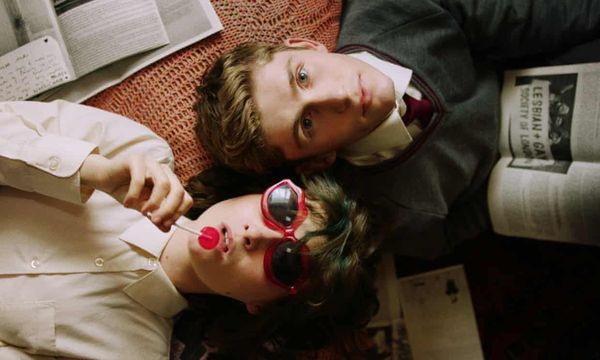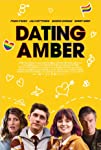Eye For Film >> Movies >> Dating Amber (2020) Film Review
Dating Amber
Reviewed by: Jane Fae

So Dating Amber, released originally as "Beards", is a “poignant” (check), “honest” (absolutely!) and “funny” (very much so) “look at the highs and lows of teenage life where the only way to fit in is to not be yourself, even if this goes against your very being”.
That’s what it says on the label and, for the most part, the label is accurate. Well, for the first half anyway. According to personal preference, you may consider that a serious weakness or strength in what might otherwise come across as yet one more frothy tale of bigotry and coming out in Ireland in the 90s.

The set-up is recognisable from other recent comedy offerings that deal with growing up and being true to yourself, including Sing Street, Sex Education (Netflix) and Normal People.
Amber (Lola Petticrew) and Eddie (Fionn O’Shea) are two teens on the brink of leaving school to begin the journey into adulthood. For Amber that means saving up to escape, to London, by illicit subletting of caravans on her mother’s caravan park to school contemporaries desperate for somewhere they can indulge their teen fumblings. Eddie, by contrast, dreams of conformity. He wants to join the army, thereby following in the footsteps of his dad, who is a career soldier and officer.
Just one slight problem: they are both gay, in a world where being gay or a “lezzer” is viewed as the ultimate transgression. Even a dangerous transgression. Every single classmate, boy and girl alike, is obsessed not only with doing it, but doing it in the most performative way possible. For the boys, the big question is which bit of female anatomy someone has gained access to. The checklist starts at breast and goes on to “fingering" and “fucking”.
For the girls, who hover round like a wake of almost-glamorous vultures, it is about pinning down one of the lads. Love would be good but, failing that, pregnancy. Pretty much no-one in this film – Amber and Eddie excepted – cover themselves in much glory and as the plot unfolds, Eddie, too, turns out to be pretty flaky.
If the behaviour of their contemporaries seems gross, it is also predictable. The world depicted in the televisual backdrop is obsessed with sex – and not in a good way. Key messages communicated from the start cover the ground from sinful sodomy to the sanctity of marriage, illustrated with “helpful”/obscene gestures from a smiling nun.
What to do? Simple. Amber persuades Eddie to fake a relationship with her, thereby scoring a helpful double -taking the heat off from rumours they are gay and notching up some extra brownie points in the classroom cool stakes. This works for a while. And then it doesn’t, leading to a dramatic climax (no, not that one!) in which both must choose how to deal with their own personal truth.
As per write-up, the film scores in the poignant, funny stakes. Though that is not entirely true. The humour is front-loaded, with the first half of the film chock-full of amusing, interesting satire on the rural approach to sex and sexuality (in 90’s Ireland). But the film never quite settles down to what sort of comedy it is. Some of the humour is subtle, some less so. Meanwhile the grinning gurning nun of the school sex ed videos is beyond credible (though if any actual Irish people would like to tell me she is real, I would be both grateful to be put right, and flabbergasted, too).
This detracts from some of the more serious messages that Dating Amber appears to want to make about how ludicrous attitudes to sexuality were. Because you may debunk incredible rules just by putting them on screen as they are. On the other hand, taking down existing rules through exaggeration and extrapolation is something else altogether. It is the difference between Private Eye and Brass Eye - and far from enhancing the message, it weakens it. Because the audience is left wondering whether this or that piece of silliness is real.
The comedy dries up from around the middle of the film, as the focus shifts from the surrounding society to how Amber and Eddie will take their lives forward. Perhaps it was always going to be a challenge to generate comedy from such material. But the result is uneven. If you started watching the film end first, it would be perhaps more accurate to describe it as tragic, thought-provoking and not funny at all.
I was also just a little irritated by the fact that (minor spoiler) pretty much all the burden, emotional and practical, on sorting out both lives, is laid on Amber. Yet again, it is the woman who ends up sacrificing her own wellbeing for a shallow boy who shows few signs of deserving her effort. You watch, you decide.
I guess, if writer/director David Freyne were aiming to take home some kudos for producing high art, it would matter more. But this is not that. It is an engaging, very watchable movie about teens growing up and dealing with a hostile society. And sometimes the laughter has to stop.
A strong supporting cast includes Sharon Horgan, Barry Ward, Lauryn Canny, and Simone Kirby.
Reviewed on: 05 Jun 2020


















